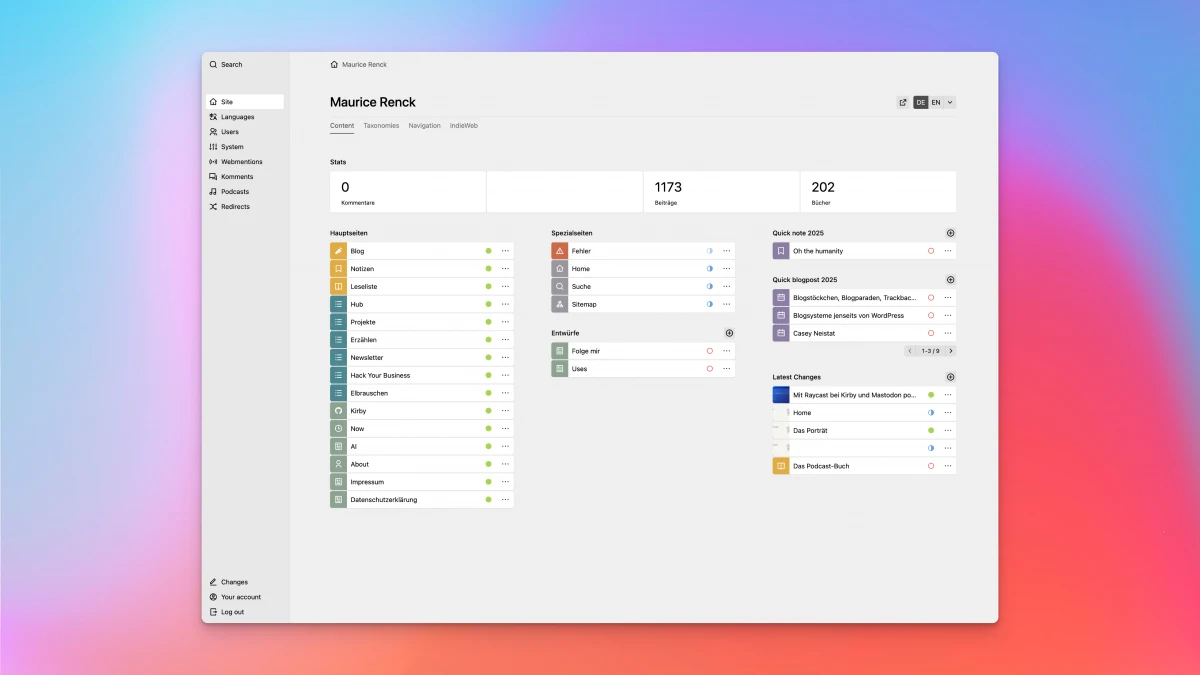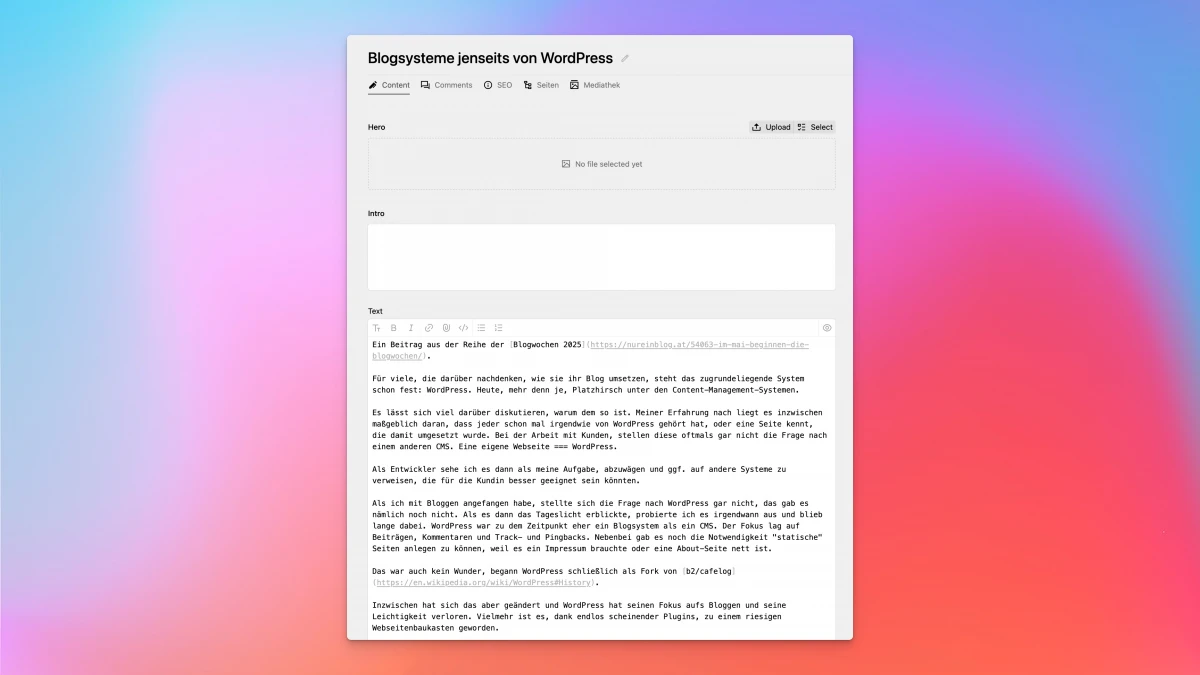Blogs beyond WordPress
For many who are thinking about how to implement their blog, the underlying system is already set: WordPress. Today, more than ever, it’s the market leader among content management systems. But there are adequate alternatives to consider.
A post from the series of Blogwochen 2025.
There’s a lot to discuss why this is the case. From my experience, it’s now largely due to the fact that everyone has heard of WordPress or knows a website that’s been implemented with it. When working with clients, they often don’t even ask about another CMS. A personal website === WordPress.
As a developer, I then see it as my task to weigh things and, if necessary, refer to other systems that might be better suited for the client.
When I started blogging, the question of WordPress didn't even arise because it didn't exist at the time. When it emerged into the light, I tried it out and stayed with it for a long time. At that time, WordPress was more of a blogging system than a CMS. The focus was on posts, comments, and trackbacks/pingbacks. Additionally, there was still the need to be able to create "static" pages because an imprint was required or an "About" page was nice.
That wasn’t a surprise, as WordPress eventually began as a fork of b2/cafelog.
Meanwhile, that has changed and WordPress has lost its focus on blogging and its lightness. Instead, it has become a huge website builder thanks to endless plugin lists.
That may suit many users, but I find it more hindering. I prefer systems that support my main task, in this case writing and publishing posts.
I had already said goodbye to WordPress about ten years ago and have been using a different system on my site ever since.
Alternatives
There are numerous alternatives to WordPress. These range from services that handle the entire technical aspect, to classic, hosted systems, to static-site generators which are more geared towards technically skilled users. Many systems, particularly those offered as services, have grown beyond simple blog systems.
Ghost
Ghost is undoubtedly one of the most well-known systems. I’ve been observing it since the initial announcement and found the technical foundation and development interesting. I’ve also considered and evaluated it for clients a few times. However, I’ve never actually used it myself, which ultimately always came down to the fact that I have very specific ideas and such systems are naturally always limited in their adaptability.
Ghost launched as a WordPress alternative, and they succeeded in doing so. Even though the system can be self-hosted, most will likely use it directly as a cloud service.
Recently, the focus has shifted strongly towards monetization, particularly memberships. A good choice, especially if you want to earn money with your texts. The newsletter system has also been expanded alongside the popularity of Substack.
Someone looking for an all-in-one publishing platform might find what they’re looking for here. Those who just want to blog a little will probably be scared off by the prices.
Steady
Actually, Steady isn't a proper blogging system, but because I was just talking about Ghost, I want to mention it at least. Steady is more of an alternative to Patreon. However, it’s possible to run a blog, newsletter, and podcast with it, and to put your content behind a paywall, either fully or partially.
Here, the focus is on memberships.
For me, it’s just an addition to my page that I’d like to use more in the future. However, anyone who doesn’t want to deal with the technology at all could find what they’re looking for here.
micro.blog
If you’re looking for a pure blogging system, you’ll find it here. The focus is clearly on blogging – with the great technical finesse of cross-posting. Miro.blog can be used like Mastodon, or as a full-fledged blog with podcast and photo features.
Blogging can be done on the web or via app. The special thing is that your blog can be subscribed to via ActivityPub, for example on Mastodon, and that posts are automatically distributed to other services.
With only one dollar a month as the lowest price, a great alternative for anyone who wants to start right away and doesn’t want to worry about anything.
Blot
Similarly, Blot is also good. I like that every post is a text file that sits on your own computer and then is synchronized via Dropbox, Google Drive, Git, or iCloud and made into a blog post.
Although one doesn't operate the system themselves here, one still retains access to their data.
Blot is very minimalist and not entirely cheap at $6 a month, but certainly a suitable alternative.
Kirby
"But Maurice, those are all subscription-based services, why?!"
Excellent question!
Most of the systems mentioned are indeed SaaS rather than self-hosted, although some do provide their source code freely.
I’m not recommending other hosted systems for just one reason: I haven’t tried any in a long time.
And that’s due to the system I use to run my own website: Kirby.
I have to confess that I tried Craft a few years ago because it looked so stylish, but my enthusiasm quickly wore off.
Anyone who follows my blog will surely know that I’m developing some plugins for Kirby and occasionally try out and blog about little experiments here.
But why Kirby?
Because of the good documentation, the nice people behind it, and the flexibility.
I admit: What is a blessing for me as a developer, can be off-putting for many users who simply want to blog. I just like to try things out and enjoy pushing boundaries, and I can easily do that with a system like Kirby.
I can not only control the appearance and behavior of my website as I want, but also the panel – the Kirby admin interface. Here’s what it looks like for me right now:


I can relatively easily write plugins and use them to build small components and interfaces, which I truly enjoy doing, for example, to be able to blog with Obsidian, or to create new posts with Raycast.
I write a lot about all these things, and I’ve created a collection page here, a collection page where you can find my articles and plugins.
What now?
Of course, there are still so many other CMS, tools for generating static pages, building block systems on the web… I could probably fill many more with them.
This post is part of a series, and others will be writing about this topic. Combined, it will likely result in a fascinating list of alternatives. Eventually, one should collect all the posts and consolidate all the systems into one post.
I wish these posts would draw attention to systems beyond WordPress. Even though WordPress is certainly a good system, there are so many other great and sometimes better-suited systems. It’s important to stay curious!
Danke fürs mitmachen bei den #BlogWochen2025
Kirby beobachte ich schon länger und bin fasziniert, wie es sich weiter entwickelt. Sollte ich mal Wordpress verlassen, wäre es auf meiner Shortlist. Noch dazu, wo man anscheinend auch recht gut eine Kirby Installation mit dem Fediverse verbinden kann.
Außerdem ist es auch für einen Laien wie mich installierbar, ganz ohne Docker oder ähnlichem.
Danke fürs Initiieren!
Bei so einem umfangreichen Blog wie deinem ist ein Wechsel natürlich auch nicht ganz ohne, da kann ich mir gut vorstellen, dass du dir das dreimal überlegst.
Hi, ich nutze schon seit 2015 Ghost auf https://herrmontag.de und sogar ganz spontan jetzt writefreely auf https://janmontag.de als .microblog. Ich bin mit Ghost ganz zufrieden, benötige aber all die Entwicklungen hinsichtlich Publikation (Newsletter diedas) nicht. Was ich spannend finde, ist, dass sie gerade das Fediverse komplett integrieren und du mit deinem Ghost Weblog vollständig teilnehmen kannst.
Bei beiden Systemen habe ich gerade Webmentions implementiert.
Grüße,
Jan
Hey,
ich finde Ghost auch weiterhin spannend und gerade diese Entwicklung in Richtung Fediverse sehr cool. Das letzte Mal, als ich für eine Kundin hineingeschaut habe, war es leider noch nicht möglich, damit einfach einen Podcast zu betreiben, das war dann in dem Fall leider ein Ausschlusskriterium. Ansonsten finde ich auch, dass Ghost von Anfang an einen guten Weg eingeschlagen hat.
Ich hab das mal hier verlinkt, weil sich dort auch immer noch Menschen hinverirren. https://assbach.de/blog/kann-man-in-deutschland-noch-kostenfrei-oder-gunstig-und-datenschutzkonform-bloggen Same topic, a couple years later..
Danke :)